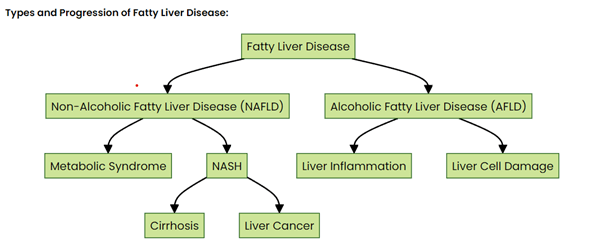Overview of Fatty Liver
Fatty liver, or hepatic steatosis, is a condition where fat accumulates in liver cells. It’s linked to obesity, diabetes, and metabolic issues, and comes in two main types: non-alcoholic (NAFLD) and alcoholic (AFLD).
- 📌NAFLD: Common in non-drinkers, associated with metabolic syndrome.
- 📌AFLD: Found in heavy drinkers, can cause inflammation and damage.
Symptoms and Diagnosis
Many with fatty liver show no symptoms, but some may experience fatigue, jaundice, or abdominal pain. Diagnosis often involves blood tests, imaging, or a liver biopsy.
- 🚩Symptoms: Fatigue, pain, jaundice, spider-like vessels, red palms, swelling.
- 🚩Diagnosis: Blood tests, ultrasound/CT/MRI, liver biopsy.
Treatment and Management
Treating fatty liver involves lifestyle changes and managing underlying conditions. Weight loss, diabetes control, and reducing alcohol are key steps.
- 🛠️Treatment: Diet, exercise, managing diabetes, cholesterol, and avoiding alcohol.
- 🛠️Medications: For inflammation or insulin resistance, though no specific NAFLD medication exists.Prognosis and Importance of Monitoring
Fatty liver can be benign, but without proper management, it may progress to serious conditions like NASH, cirrhosis, or liver cancer. Regular monitoring is crucial.
- 📈 Prognosis: Can be reversible, but poses risk of serious liver diseases.
- 📉 Monitoring: Essential to track liver health and treatment efficacy.

Here are some general Ayurvedic approaches to treating fatty liver:
Dietary Changes
- Increase Fiber Intake: Consuming more fiber can help reduce fat accumulation in the liver. Foods like whole grains, fruits, and vegetables are recommended.
- Limit Fat and Sugar: Reducing the intake of saturated fats and simple sugars can help manage fatty liver.
- Spices: Use of spices like turmeric, ginger, and black pepper can aid digestion and have anti-inflammatory properties.
- Warm Water: Drinking warm water with lemon in the morning can stimulate liver function and help in detoxification.
Ayurveda Treatment
Herbal remedies have been used for centuries to support liver health and treat various liver conditions, including fatty liver. These remedies are often part of traditional medicine systems such as Ayurveda, Traditional Chinese Medicine (TCM), and others. However, it’s important to note that while some herbs may offer benefits, they should not replace conventional medical treatment, and their use should be discussed with a healthcare professional. Here are some herbs that are commonly mentioned in the context of fatty liver:
- Milk Thistle (Silybum marianum):
- Active component: Silymarin, which is a complex of flavonolignans.
- Benefits: Milk thistle is perhaps the most well-known herb for liver health. It is believed to have hepatoprotective properties, helping to prevent toxins from penetrating liver cells and promoting liver cell regeneration.
- Turmeric (Curcuma longa):
- Active component: Curcumin, a powerful antioxidant.
- Benefits: Turmeric has anti-inflammatory and antioxidant properties that may help reduce liver inflammation and oxidative stress associated with fatty liver disease.
- Dandelion (Taraxacum officinale):
- Benefits: Dandelion root is traditionally used to stimulate bile production and support liver detoxification processes. It may also have diuretic properties, which can help reduce water retention.
- Artichoke (Cynara scolymus):
- Benefits: Artichoke leaf extract is thought to support liver function by increasing bile production and improving fat metabolism in the liver.
- Schisandra (Schisandra chinensis):
- Benefits: In TCM, schisandra is used to protect the liver from toxins and to enhance liver function. It is considered both an adaptogen and a hepatoprotective herb.
- Bupleurum (Bupleurum falcatum):
- Benefits: This herb is often used in TCM formulas for the liver. It is believed to help regulate liver function and reduce liver inflammation.
- Ginger (Zingiber officinale):
- Benefits: Ginger has anti-inflammatory properties and may help improve antioxidant status, which can be beneficial for liver health.
- Licorice (Glycyrrhiza glabra):
- Benefits: Licorice root contains glycyrrhizin, which has been shown to have protective effects on the liver. It may help reduce liver inflammation and prevent liver damage.
- Fennel (Foeniculum vulgare):
- Benefits: Fennel seeds are traditionally used to support digestion and liver health. They may help stimulate the production of bile.
- Peppermint (Mentha piperita):
- Benefits: Peppermint has a calming effect on the digestive system and may help improve bile flow, aiding in liver detoxification.
Lifestyle Modifications
- Regular Exercise: Physical activity can help reduce fat in the liver and improve overall metabolic health.
- Stress Management: Practices like yoga and meditation can help manage stress, which is believed to affect liver health in Ayurveda.
- Adequate Sleep: Ensuring enough restful sleep is important for liver detoxification and overall health.
Detoxification Practices
- Panchakarma: This is a cleansing and rejuvenation program used in Ayurveda to eliminate toxic substances from the body. It may include treatments like Vamana (therapeutic vomiting) and Virechana (purgation) under the guidance of an Ayurvedic practitioner.
Sample Ayurvedic Diet for Fatty Liver
- Breakfast: Oats with almonds and a pinch of cinnamon
- Mid-Morning Snack: A piece of fruit like papaya or apple
- Lunch: Quinoa salad with lots of vegetables and a dressing made with lemon and herbs
- Afternoon Snack: Herbal tea with some roasted chickpeas
- Dinner: Steamed vegetables with a small portion of lean protein like chicken or fish, seasoned with turmeric and ginger



